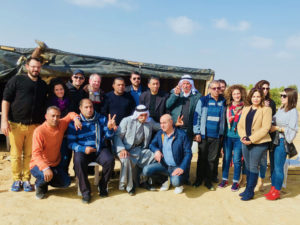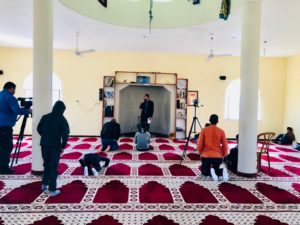Mixed Cities Course Visits the Naqab\Negev
 Our Leaders in Mixed Cities course visited the Naqab/Negev to learn about Jewish-Arab relations in the south, and to learn about the unrecognized villages’ struggle to gain recognition.The tour started with a visit in the unrecognized village of Al-Araqib, which was demolished over 128 times. In the village the group met with Sheikh Sayah who explained the legal and civil struggle to gain recognition and stop the demolitions. Sheikh Sayah also explained and criticized the questionable negotiation tactics used by the Israel Land Authority and the Authority for development and settlement of Bedouins when negotiating with the residents. The participants expressed that they had not been aware about this important struggle which has been going on for years.
Our Leaders in Mixed Cities course visited the Naqab/Negev to learn about Jewish-Arab relations in the south, and to learn about the unrecognized villages’ struggle to gain recognition.The tour started with a visit in the unrecognized village of Al-Araqib, which was demolished over 128 times. In the village the group met with Sheikh Sayah who explained the legal and civil struggle to gain recognition and stop the demolitions. Sheikh Sayah also explained and criticized the questionable negotiation tactics used by the Israel Land Authority and the Authority for development and settlement of Bedouins when negotiating with the residents. The participants expressed that they had not been aware about this important struggle which has been going on for years.
After the meeting in Al-Araqib, the group arrived at another unrecognized village, Um Al-Hieran. Their visit to the village came just a few days before the one-year memorial of the killing of Yacoub Abu Al-Qian, who was killed by the police when authorities came before dawn to demolish homes. The group met with his nephew, Ra’ed Abu Al-Qian who is leading the village’s struggle for recognition. Ra’ed spoke about the village and the expulsion of the tribe from Wadi Zubalah to their current location decades ago by the state. Currently the village is facing demolition and expulsion from their current location, due to plans and construction to build a new Jewish town in their place. In appreciation of the visit, one of the group’s participants was invited to lead the Friday prayers at the mosque in the village, and the entire group was invited to lunch in the village.
The day ended with a lecture by Prof. Oren Yiftachel about land policy in the Naqab/Negev, and the State’s attempts at grabbing land, starting from the Goldberg report all the way to the Prawer plan. The lecture presented the current situation of the Bedouins in the Naqab/Negev, the villages in which they live and the quality of the services they receive.
Atwa Abu Kharma, a journalist from Rahat and a participant in the course who organized the visits, said that he really enjoyed organizing the tour and hosting the group in his area. He also added that the village’s residents really appreciated the visit and interest in their struggle and wanted to share more and more.
This is the third time that participants in the Leaders for Change in Mixed Cities have visited the Negev\Naqab and the unrecognized villages. It is an important tour from which participants receive inspiration, especially seeing the residents’ persistence in their struggle for recognition.
Writer: Dr. Roi Silberberg, co-facilitator and program director at the School for Peace
